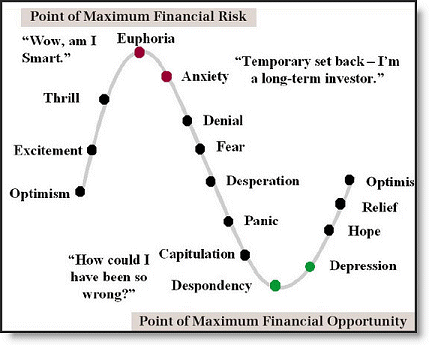Feeling Good About Your Investments? Here's Why That Could Be A Bad Sign
After a very rocky start to the year, the SPDR S&P 500 ETF Trust SPY is up 65.2% since its March lows and is making new all-time highs. Investors who bought at or near the market bottom back in March are likely feeling like investing geniuses right about now — but that good feeling could actually be a warning sign of danger ahead.
One of the first lessons new investors must learn about how the stock market works is that a large part of the movement in the market is based on psychology. Peaks and troughs in the stock market cycles coincide with peaks and troughs in investor sentiment, or how bullish or bearish investors feel.
The problem with what’s known as the “investor sentiment cycle” is that the times at which investors feel the best are often the best times to sell. A stock’s price is determined by how much investors believe it is worth. The psychology of investing in the market is the reason so many opportunities are created.
“Be fearful when others are greedy and greedy when others are fearful,” Warren Buffett once said. The wisdom of this quote can be understood when looking at the investor sentiment cycle graphic:

Investor Sentiment Cycle Explained
The idea behind the investor sentiment cycle is that human emotions are backward-looking. A typical shareholder experiences emotional reactions to changes that have already occurred. When a stock falls, traders get angry or scared. When it climbs, traders feel excited and confident. The problem is that these emotions often lead traders astray because they have no predictive value.
The emotions attached to a particular investment are often associated with the point in the investor sentiment cycle that the stock was purchased. Investors who bought stocks back in March are likely now feeling very positive about that decision. Unfortunately, that “wow, I am good” feeling is exactly how investors feel near the peak of a stock’s cycle.
Bitcoin (BITCOMP) investors may remember this feeling back in December 2017, or cannabis investors may remember having it in 2018. Many electric vehicle stocks investors have likely been feeling it throughout 2020.
Emotional Rollercoaster
A trader’s first reaction when a buy turns profitable will be a feeling of joy. It is natural to think, “This is easy, I'm great at picking stocks.” The challenge at this point, the peak in the investor sentiment cycle, is to not make the mistake of buying more expensive shares.
This period of the cycle comes with feelings of confidence and excitement because the rise in share price has provided positive reinforcement for the purchase. It is a fun experience, and it’s natural to want the fun to continue. Yet this is the point in the cycle when Buffett might be selling. As a stock price starts to fall, investors will initially rationalize the drop as simple market volatility, a healthy correction, or just a bump in the road.
The further it falls, the more that denial turns to what can seem like an overwhelming sense of panic and regret. Those feelings often correlate to the trough in the sentiment cycle. When you feel like the most foolish person in the world for ever having bought the stock, it may be the exact time Buffett or other savvy investors are getting greedy.
Benzinga’s Take
Unfortunately, when investors are successful, they often become overconfident. This overconfidence leads to more risky investment decisions, often at the worst possible times.
There’s certainly nothing wrong with being confident in your investment acumen. All investors, but particularly younger and newer investors, should remember that there were plenty of investors feeling like geniuses at the peak of the dot-com bubble, at the height of the subprime mortgage bubble, and with the S&P 500 at all-time highs prior to the coronavirus pandemic in early 2020.
If you were fortunate enough to buy or add stocks at or near the 2020 market bottom, congratulations. But remember that the better you feel about your investments, the more you should be on the lookout for a potential market top.
© 2020 Benzinga.com. Benzinga does not provide investment advice. All rights reserved.



